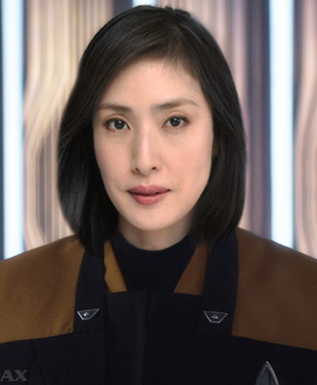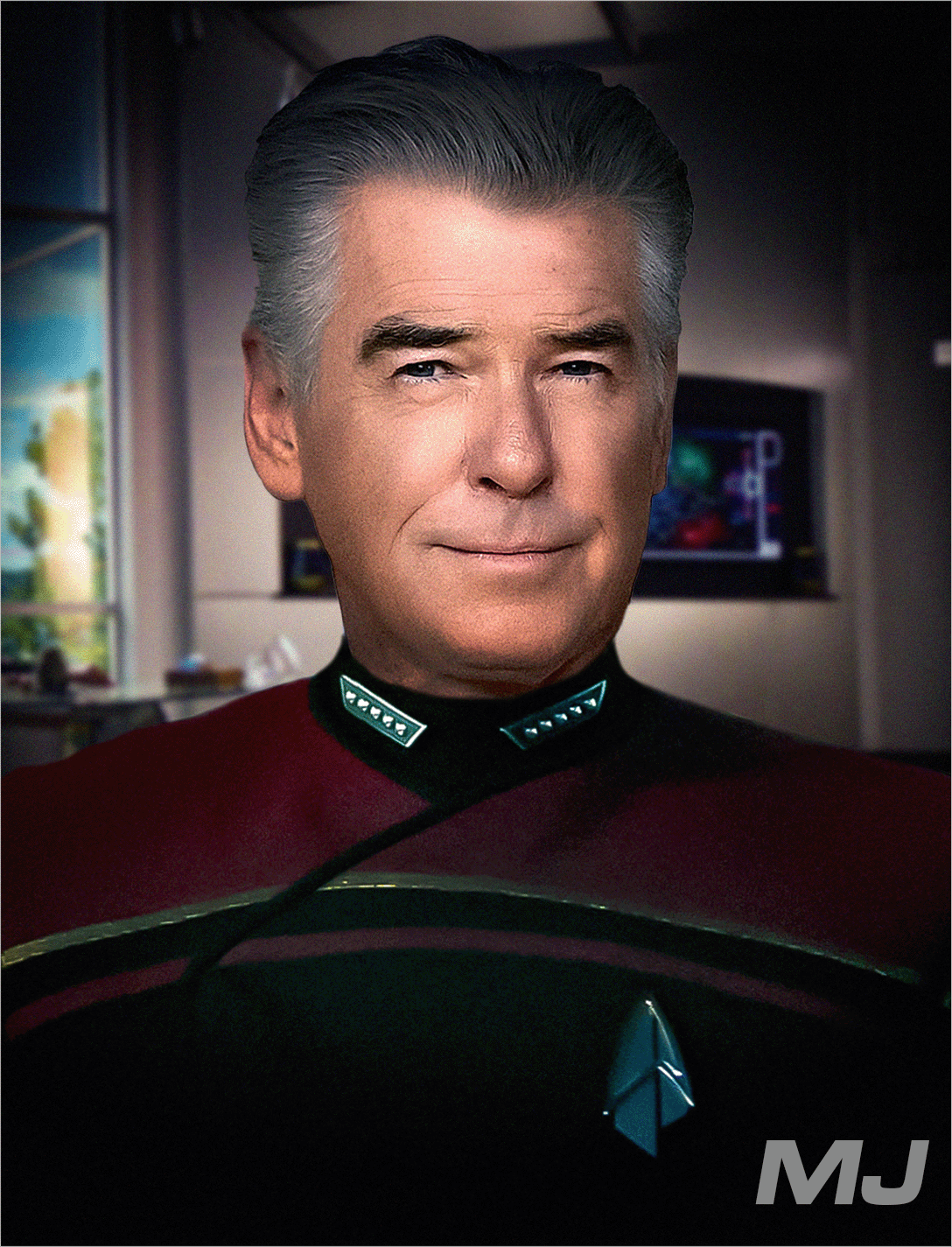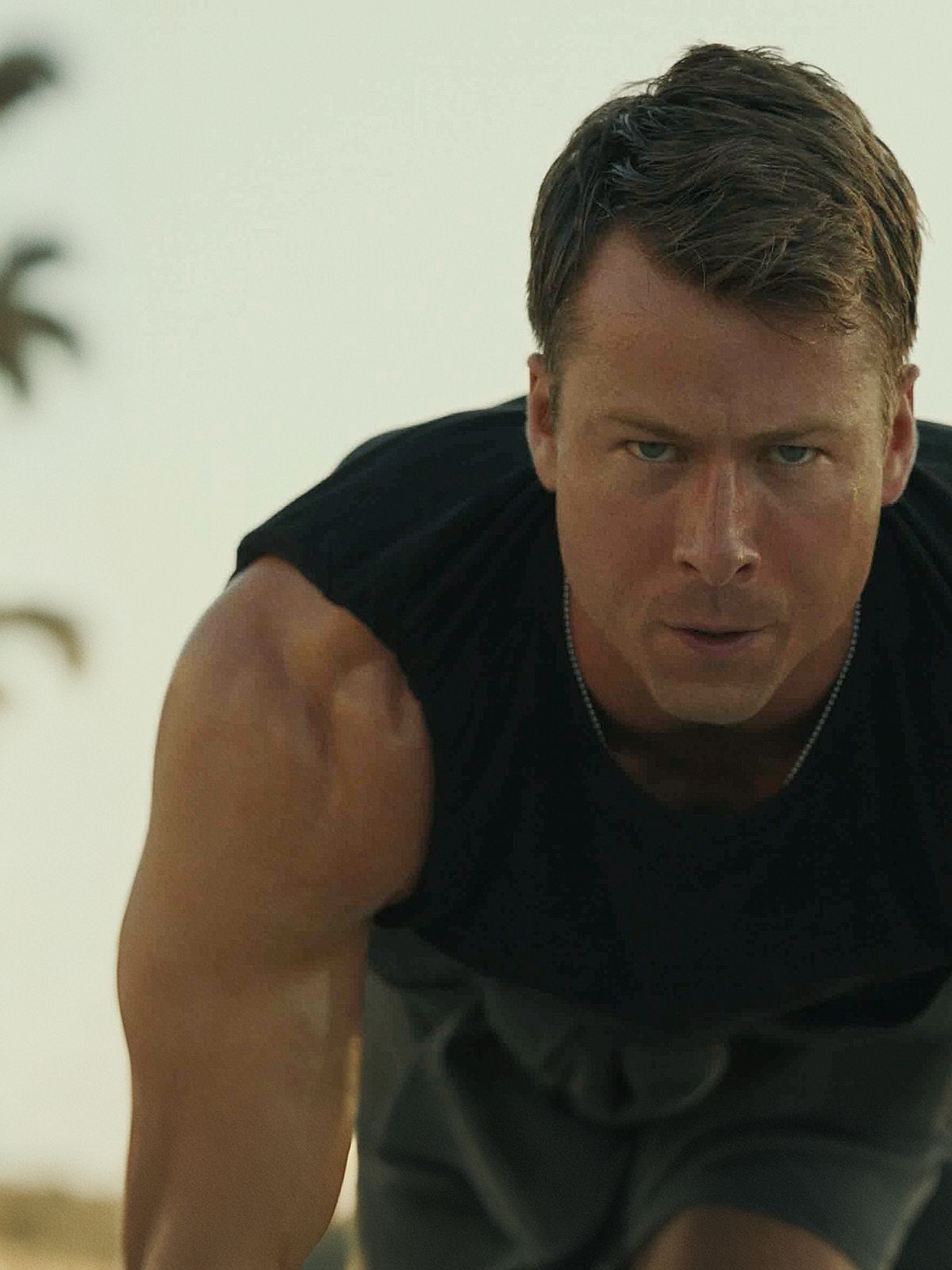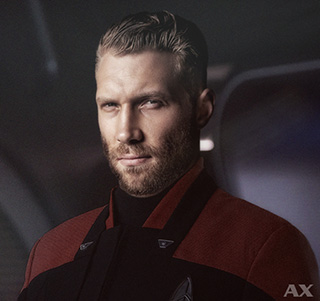Yuulik couldn’t hear much of anything aside from the sound of her own breathing. There were too many choices swirling around this one moment. Trodding through the brutalist architecture of this Walker-class corridor, Yuulik took a wrong turning. She was lost enough in her own thoughts, let alone the decks of an unfamiliar starship. Yuulik attempted to mentally calculate the number of parallel quantum realities that would branch out from this one decision but the calculations eluded her.
She held out her tricorder, using it as a social shield to avoid eye contact with the passing crew members who couldn’t possibly recognize Yuulik’s twenty-fifth-century Starfleet uniform. Yuulik waved the tricorder’s sensors at those crew members, and the raw duranium bulkheads of the USS Brigadoon itself, to gather measurements at a molecular level. She couldn’t hear the musical warble of the tricorder at work, but the blinking graphics on its touchscreen assured Yuulik that it was still operating. All she could hear was the guttural sound of her own heavy breathing.
Yuulik also couldn’t hear the voices of her other away team members from the USS Sarek. However, Yuulik assumed that was because she had ducked into a turbolift while they were speaking with the starship’s captain on the bridge.
When Yuulik stepped into the research laboratory, she felt a shiver circle the back of her neck. Almost immediately, she missed the brutalist grandeur of the corridors. The compartment was shaped like a hexagonal prism and it was over-crowded with all manner of scientific instruments and chairs and half-assembled experiments. She may have felt a pang of claustrophobia if not for the single viewport on the opposite bulkhead.
In the reflection of the viewport, Yuulik saw a figure move. She heard a feminine voice clear her throat. Yuulik wasn’t alone. Even when Yuulik caught sight of a blue Starfleet uniform in her peripheral vision, she maintained her forward gaze. She didn’t look. She simply tucked her tricorder into the holster on her hip.
“Would you show me around the arts and crafts in your quaint little research lab?” Yuulik asked. “I need to understand what we’re working with here.” To her surprise, her own intonation sounded an awful lot like Captain Taes’ Deltan accent when affecting her formal timbre.
“Ah, I see. That’s how it is,” the other woman huffed. “I’m Junior Lieutenant DeVoglaer; thanks for asking!” Her vowels sounded as round as Jupiter and her consonants sounded clipped, but the sarcasm was the most distinguishable trait.
DeVoglaer strode to the nearest workstation and Yuulik carefully followed at the distance and pace necessary to keep DeVoglaer in her peripheral vision. DeVoglaer flipped two switches on the control panel and swiped a finger over the neon-blue touchscreen interface.
“This is our nuclear electronics analysis system,” DeVoglaer explained. A barb of sarcasm remained embedded in her remark. “Our crafty shipbuilders designed the pulse height analyzers to rival anything the Vulcans are using today. Er…”
Dismissively, Yuulik turned her back on DeVoglaer and the analysis system. Her breathing had levelled out and the panic in her body had reduced to yellow alert. She strode easily to the next workstation along.
Yuulik tutted and she said, “I didn’t study Starfleet antiques at the academy.”
Tentatively, DeVoglaer replied, “I can describe for you how the equipment works, but I don’t fully understand the whys. I don’t work in science. I’m an operations officer, remember?”
Distracted by another tall piece of scientific instrumentation, Yuulik moved towards it, hypnotized by her own curiosity.
“What ever happened to all your science officers?” Yuulik asked. It came out sounding like a perfunctory question.
“There’s a war on,” DeVoglaer answered. Yuulik could identify a frustrated, bristling energy in DeVoglaer voice. “We were never crewed with a proper science department and then all our science officers were killed in their last experiment to free the ship maybe… fifty years ago? I’ve lost track.”
Coming to stand at a freestanding computer console, Yuulik slapped her hands down on the edges. She drank in the image of the cone-shaped scientific instrumentation propped up behind the console. It looked green and prickly with candy-coloured jewel buttons sparkling throughout it.
“Now what does this equipment do?” Yuulik asked hungrily.
DeVoglaer’s voice went high as laughter bubbled out of her: “Yuulik, that’s a Christmas tree!”
“I don’t get it,” Yuulik remarked.
“Christmas eve was only two weeks ago.” DeVoglaer sighed. When she continued, her spiky inflection had deflated to something tentative and sad. “We haven’t had the heart to take it down yet. I suppose… for you… my last Christmas was two hundred years ago. Oh god, do you even have Christmas in the future?”
Bluntly, Yuulik replied, “I don’t know what Christmas is, but it sounds like whimsical bullshit. For the record, it wasn’t two hundred years ago. Your crew went missing only one hundred and forty-three years ago.”
“Look at you,” DeVoglaer said. A fire had returned to her voice and it sounded like a dangerous fusion of pointed and proud. “On Constitution-class starships, only the sciences wear blue uniforms.”
Squeaking in excitement, DeVoglaer concluded, “You did it, Yuulik! You became Ship’s Science Officer!”
Yuulik turned around, her eyes locking on DeVoglaer for the first time in years. She looked at DeVoglaer –really looked at her– more intently than she had done with the Christmas tree. Standing there in her blue skant with its snatched copper panelling down the sides, DeVoglaer demonstrated the posture of someone who had never been self-conscious one day in her life. Her generous bouffant was styled with parted bangs over her eyes and dark hair cascading over her shoulders. And then there were the boots. Of course, she was wearing thigh-high boots.
Stunned into silence, Yuulik crossed her right arm over her chest and took hold of her left elbow. She tried to speak but her voice came out small and diffident.
Choosing her words carefully to avoid any explicit lies, Yuulik said, “I am. I am the senior-most Starfleet science officer aboard the USS Sarek.”
Like a wave pulled to shore, DeVoglaer crashed into Yuulik with her arms open wide. She wrapped Yuulik in a hug and told her how proud she was of her. Yuulik’s breath caught in her throat because her arm was still crossed over her chest. She remembered from her Starfleet Academy days that Humans thought it most polite to be hugged back when they hugged somebody. Yuulik hypothesized there might even be a visceral thrill to laying her own hands on DeVoglaer’s lower back. But her arm was stuck in between them because of how tightly DeVoglaer was hugging her. Almost as soon as it happened, it was over. DeVoglaer stepped back to look Yuulik up and down boldly.
“I like your hair like that,” DeVoglaer said.
Yuulik raised a hand to the side of her head. That morning, she had styled her two stripes of brown hair like twin fin-shaped mohawks.
“I haven’t dyed it pink in a long time,” Yuulik said. “You look exactly, exactly the same, Nova.”
“You do remember me!” DeVoglaer said with great relief. The way her body moved, she looked about ready to hug Yuulik again, but then a figurative cloud passed over her eyes.
DeVoglaer asked, “Wait, did you pilot that shuttle aboard alone?”
From the wide hatchway, an intruder said, “No, she was merely too rude to introduce me,” and she said it in a snide sing-song.
Standing in the doorway with her hands on her hips was Science Chief Flavia. Yuulik examined Flavia’s quilted Romulan jumpsuit in a brief moment of second-hand despair, but she couldn’t see anything that distinctly identified her science chief as being a citizen of the Romulan Free State. Not that, Yuulik supposed, a Human from DeVoglaer’s time period would even know what a Romulan looked like. But it would have been too much to explain. Wandering around a Starfleet starship, Flavia’s pointed ears and relatively smooth brow would make her look like a Vulcan to the Brigadoon‘s crew.
Accordingly, DeVoglaer raised her palm in Flavia’s direction and spread her fingers in the traditional Vulcan salute.
“I’m Lieutenant Junior Grade Indira DeVoglaer, operations officer,” she said. “But everyone calls me Nova because I’m so bright. Peace and long life to you.”
Leaving her hands on her hips, Flavia sneered at DeVoglaer. She shook her head as she marched into the laboratory.
“Live long and don’t do that, lieutenant,” Flavia remarked. She raised her chin at DeVoglaer. “Your captain is thick with inspirational speeches but light on evidence. What did you do to your ship?”
DeVoglaer turned her head, staring at Yuulik through her thick curtain of bangs. She lowered her gaze and then she cracked her knuckles. She nodded twice before she answered Flavia’s question.
“War’s going badly. We were forced to run. Captain doesn’t like to talk about it,” DeVoglaer said softly. “The USS Branchus found herself on the wrong side of a blockade ahead of us and too much Federation territory occupied by the Klingons behind us. There was no path home, so we ran beyond Klingon and Federation borders. When we discovered the temporal vortex, we thought it might be a worm–“
“But it didn’t displace you through space,” Yuulik said impatiently. “The Branchus and her crew were displaced through time.”
DeVoglaer closed her eyes and briskly nodded once. “Before we even finished our sensor analysis, the vortex tore us into a temporal inversion fold.” She folded her hands over her abdomen. “We fell out of sync with space and time inside. The ship and our bodies discorporate, but we don’t cease to exist. Without our corporeal forms, time passes more slowly–“
“But more quickly too,” Yuulik added.
“Yuh– yes,” DeVoglaer begrudgingly acknowledged. “It’s hard to describe once we’re back in our own bodies again. It’s not linear. Every seven years, we emerge from the temporal inversion fold. We become solid again for a week, a few days. Every time we reappear, our time in the space-time continuum becomes shorter. The vortex is able to build to its cascade effect more quickly and it temporally displaces us all over again. We become non-corporeal for another seven years until the vortex spits us out another time.”
Flavia blinked at DeVoglaer, unimpressed.
“Why don’t you flee when you’re solid?” Flavia asked.
Looking to Flavia, DeVoglaer shook her head. She pouted in that way Yuulik had seen before, in those infrequent times DeVoglaer considered her words before thinking out loud.
“Our engines could never overpower the gravitational pull of the vortex,” DeVoglaer said. “This far out from Klingon and Federation space, we could never find another ship on long-range sensors. No one ever responded to our hails, except for–“
“They’re trapped,” Yuulik declared, “slightly out of phase with the spacetime continuum. The ship and her crew are in a state of temporal flux.”
Flavia squinted at Yuulik. “We thought it was interference from the vortex when the Sarek couldn’t lock its tractor beam on the Brigadoon–“
“It was temporal flux,” DeVoglaer started to say.
Excitedly, Yuulik interrupted, “It was temporal flux. We couldn’t attain a transporter lock on any of the Brigadoon‘s crew either.” Her words tumbled out of her as an interlinked chain of data; Yuulik hardly stopped to breathe.
“I’ve scanned their bioelectric patterns,” Yuulik added. “Their molecules are literally entangled with the vortex! They’re trapped. Until they and the vortex vanish into the inversion fold again.”
“Yuulik! Stop!” DeVoglaer screamed.
A rational part of Yuulik thought DeVoglaer’s reaction was a bit overdramatic and yet her face still went hot. Yuulik’s body went tight; she didn’t move; she didn’t know what to say.
DeVoglaer didn’t stop: “Respectfully! Stop interrupting me!”
Flavia wasn’t afflicted with the same abulia as Yuulik.
“Nova, I think I’m going to like you,” Flavia said, plainly pleased by the outburst.
“It’s possible,” DeVoglaer wryly admitted, “everyone really calls me Nova because of my temper.”
“Got it,” Flavia replied blandly. She quickly moved on to say, “When I asked you what you had done to your ship, I was speaking about your saucer section. It says USS Brigadoon, but this ship is the USS Branchus.”
“Oh, that,” DeVoglaer said sheepishly. “It’s an inside joke based on an old movie about a Highlands village that would fade in and out of spacetime. We re-christened the ship. Something to amuse ourselves.”
“Like your ‘Brigadoon-type’ planets,” Flavia caught on. “Got it.”
Smirking fondly, Yuulik added, “They programmed their DOTs to repaint the hull.”
Flavia shook her head at Yuulik incredulously. “Yuulik, you know Nova already, don’t you?”
Yuulik looked at DeVoglaer and she saw DeVoglaer was already watching her.
“The last time the USS Brigadoon returned to normal space,” Yuulik said, “the USS Dvorak picked up her distress call. That’s where I was serving my cadet cruise. Because the captain refused to trust my brilliant solution, the Dvorak failed to save the Brigadoon from fading into the vortex that time. Nova and I never met in person, but we spent days talking over subspace. On each of our ships, we two were responsible for monitoring the exact measurements of the Brigadoon‘s temporal flux.”
Yuulik grinned at DeVoglaer until her face hurt.
“Nova is truly an officer of substance,” Yuulik promised. “Not a button-pusher like some. She’s impressive down to her sub-atomic particles. And Flavia, I have a secret. I devised a plan to rescue her.”

 Bravo Fleet
Bravo Fleet














